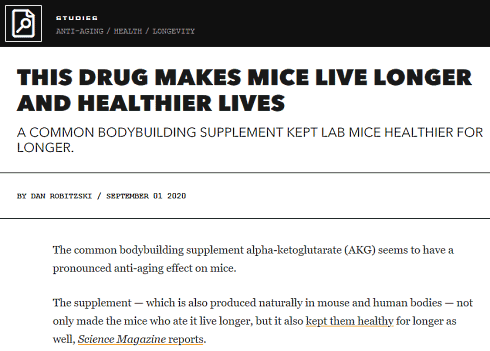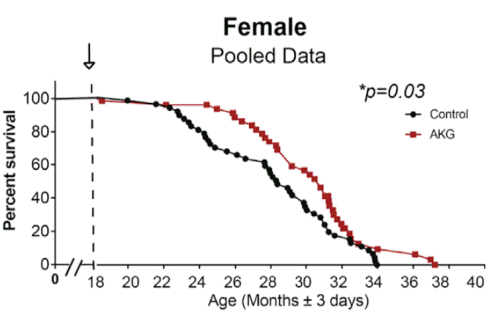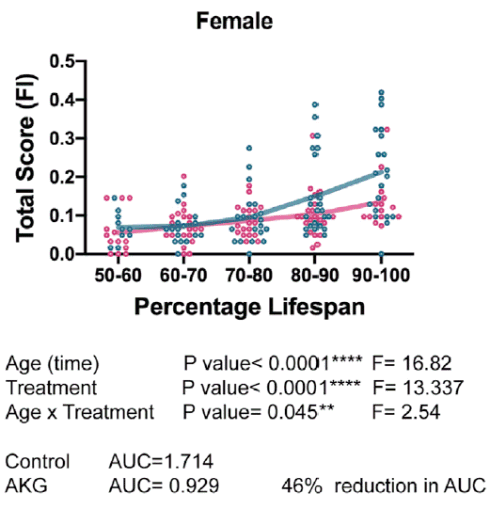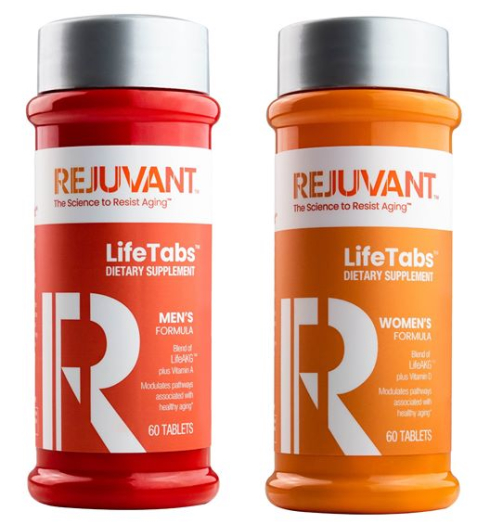AKG, a problematic health span enhancer
AKG, a bodybuilding supplement that seems to have lost some of its shine in strength sports, may be the secret to a long, yet healthy life. Scientific websites that paid attention to the animal study by the American Buck Institute for Research on Aging, which appeared in Cell Metabolism in the late summer of 2020, report this.For example, the article below appeared on the Futurism.com on September 1, 2020. [Link]
[FONT="]
[/FONT]

[FONT="]
[/FONT]
Study
The researchers had previously shown that AKG, a substance produced by the body by metabolizing glutamate, extends the life of worms by about 50 percent under laboratory conditions. The compound inhibits the enzyme ATP synthase that enables cells to produce ATP, mimicking the effect of calorie restriction. This study dates from 2014. In the 2020 study, the researchers went a step further and experimented on lab mice instead of worms.The mice were given AKG through their food from the age of 18 months onwards. 18 months old mice are middle aged.
Results
Supplementation with AKG extended the lifespan of the average female mouse by an average of about 13 percent, and the lifespan of the average male mouse by 11 percent.
[FONT="]
[/FONT]

[FONT="]
[/FONT]
More remarkable was that AKG supplementation kept the mice fit and healthy for longer. As mice age, they become less agile, less curious and their fur thins. Based on these and other aging symptoms, scientists can calculate the Frailty Index [FI] of mice.
The higher the FI, the more aged mice are.
The figure below shows that AKG supplementation reduced the rise in FI in the final stage of life of the mice. The figure refers to females, but the figure for the males is not essentially different. AKG thus not only extends the life span of the mice, but has an even more convincing effect on their health span.
[FONT="]
[/FONT]

[FONT="]
[/FONT]
Mechanism
The researchers also experimented with old cells to learn more about AKG's mechanism of action. A number of inflammatory genes become more active in these aging cells. However, AKG exposure kept the inflammatory genes from getting activated.
Click on the figure below for a larger version.
[FONT="]
[/FONT]

[FONT="]
[/FONT]
AKG probably switches these inflammatory genes down a notch because AKG increases the production of the anti-inflammatory cytokine interleukin-10 in immune cells.Sponsor
The researchers were sponsored in part by Ponce de Leon Health, [pdlhealth.com] a company that develops supplements to slow down aging.
Ponce de Leon is already marketing a product that contains a form of AKG. Rejuvant contains the calcium salt of AKG. [nutraingredients-usa.com 25-Oct-2019]
This also happens to be the form of AKG used by the researchers at the Buck Institute for Research on Aging. A recommended daily amount of Rejuvant provides one gram of calcium AKG per day.
[FONT="]
[/FONT]

[FONT="]
[/FONT]
1 g/day in itself is a reasonable dose. Supplement companies advise consumers to use other forms of AKG in doses of 3-5 grams per day.
Keep in mind that about 20 percent of calcium AKG consists of calcium, and you can overdose calcium. The human equivalent of the dose the Buck Institute researchers gave their lab mice is 20-30 grams of calcium AKG per day. That dose is not safe for humans. AKG is undoubtedly unhealthy at these doses. And consuming 5 grams of calcium daily for life? That is not going to end well either.
According to scientific websites, more studies into the life-extending effects of AKG are in the pipeline. Let's hope that this includes studies with a responsible dose of AKG.
Source:
Cell Metab. 2020 Sep 1;32(3):447-456.e6.

|
[FONT="]
[/FONT]

[FONT="]
[/FONT]
Study
Results
Supplementation with AKG extended the lifespan of the average female mouse by an average of about 13 percent, and the lifespan of the average male mouse by 11 percent.
[FONT="]
[/FONT]

[FONT="]
[/FONT]
More remarkable was that AKG supplementation kept the mice fit and healthy for longer. As mice age, they become less agile, less curious and their fur thins. Based on these and other aging symptoms, scientists can calculate the Frailty Index [FI] of mice.
The higher the FI, the more aged mice are.
The figure below shows that AKG supplementation reduced the rise in FI in the final stage of life of the mice. The figure refers to females, but the figure for the males is not essentially different. AKG thus not only extends the life span of the mice, but has an even more convincing effect on their health span.
[FONT="]
[/FONT]

[FONT="]
[/FONT]
Mechanism
The researchers also experimented with old cells to learn more about AKG's mechanism of action. A number of inflammatory genes become more active in these aging cells. However, AKG exposure kept the inflammatory genes from getting activated.
Click on the figure below for a larger version.
[FONT="]
[/FONT]

[FONT="]
[/FONT]
The researchers were sponsored in part by Ponce de Leon Health, [pdlhealth.com] a company that develops supplements to slow down aging.
Ponce de Leon is already marketing a product that contains a form of AKG. Rejuvant contains the calcium salt of AKG. [nutraingredients-usa.com 25-Oct-2019]
This also happens to be the form of AKG used by the researchers at the Buck Institute for Research on Aging. A recommended daily amount of Rejuvant provides one gram of calcium AKG per day.
[FONT="]
[/FONT]

[FONT="]
[/FONT]
1 g/day in itself is a reasonable dose. Supplement companies advise consumers to use other forms of AKG in doses of 3-5 grams per day.
Keep in mind that about 20 percent of calcium AKG consists of calcium, and you can overdose calcium. The human equivalent of the dose the Buck Institute researchers gave their lab mice is 20-30 grams of calcium AKG per day. That dose is not safe for humans. AKG is undoubtedly unhealthy at these doses. And consuming 5 grams of calcium daily for life? That is not going to end well either.
According to scientific websites, more studies into the life-extending effects of AKG are in the pipeline. Let's hope that this includes studies with a responsible dose of AKG.
Source:
Cell Metab. 2020 Sep 1;32(3):447-456.e6.
